The Best Fado in Lisbon: 11 Fado Houses to Explore

Fado is more than a music genre; it is a feeling.
You should listen to or watch a live performance to understand its magic. Keep reading this article to learn more about fado and also learn about where you can experience the best fado in Lisbon.
First of All: What is Fado?
Fado is a unique kind of music. Some say this Portuguese style of music sounds like a cross between the opera and the blues.
The word fado means fate or destiny, and the themes in fado are primarily about “Saudade” (the feeling of missing something), nostalgia, jealousy, and small everyday stories.
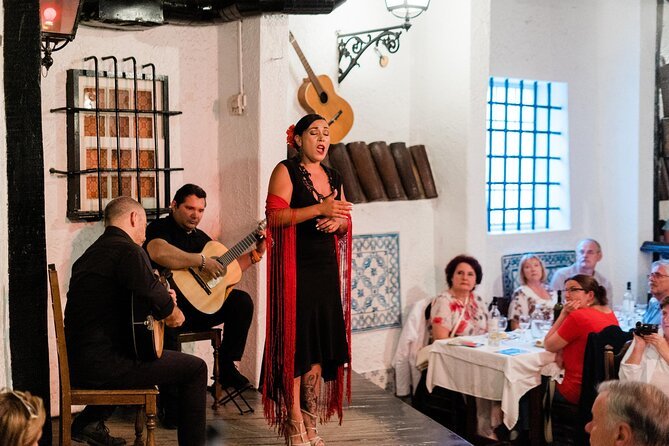
Want to go On a Group Fado Tour 🎶❤️
We recommend Lisbon Fado Dinner & Tour or Porto Heritage Tour With Fado Show & Dinner.
Nowadays, although traditional fados are generally nostalgic and melancholic, there are also modern fados with cheerful themes. A new generation of fado singers, fadistas, and instrumentalists have introduced new themes and sounds.
Usually, fado is sung by a single person accompanied by a classical guitar and a Portuguese guitar. The Portuguese guitar is also called a fado guitar. It is smaller than a regular guitar, a chordophone with six pairs of strings, and a pear-shaped harmonic box.
There are two main models of this type of guitar–the Lisboa and the Coimbra models. But we will talk about this a little later in the article. It takes three to fado, but this has been changing over time. Fado music is a type of music that will move you, even if you don’t understand the Portuguese language.
Fado is so unique that it was elevated to the Cultural and Intangible Heritage of Humanity category by UNESCO in 2011. Incredible, don’t you think?
The History of Fado
There are many reasons to fall in love with fado, one of which is its history. The fado roots are a mystery, but musicologists see it as a fusion of cultures, mainly African and Brazilian, stemming from Portugal’s maritime and colonial past, combined with its oral poetry tradition and, possibly, some Berber-Arab influence from the long Moorish presence that spanned the 8th through the 13th centuries.
History says that fado was first sung by homesick Portuguese sailors in the 15th and 16th centuries and appeared in Lisbon in the 19th century. In the 1800s, this music was present in popular contexts, sung spontaneously indoors or outdoors: in gardens, streets, taverns, and cafés. The lyrics sing the daily narratives and express urban themes.
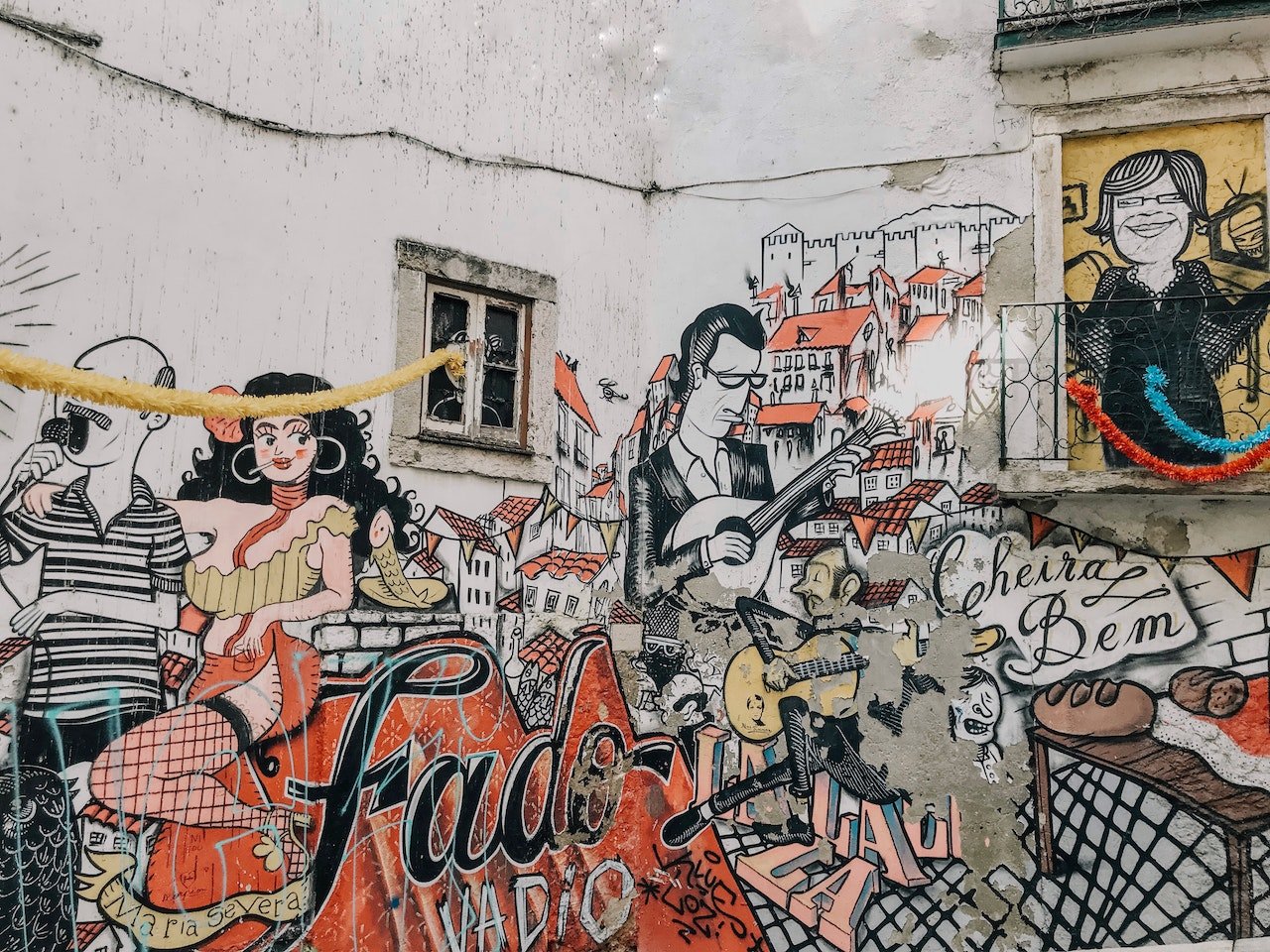
The beginnings
The history of fado includes the myth of the amorous involvement of an aristocrat, the Count of Vimioso, with Maria Severa Onofriana (1820-1846), a prostitute hailed for her talents as a singer. Have you ever heard about it? This legend has inspired many fado songs, poems, a novel, and a film.
Maria Severa Onofriana was the first Portuguese fado singer and guitarist, and because of that, she became an icon. There’s nothing documented, but what is known is that she performed in brothels, mainly in Bairro Alto and Mouraria. Severa also served in aristocratic parties due to her relationship with Count Vimioso. The poet Raimundo António de Bulhão Pato, who met her personally, described her as “an exciting fado singer like Mouraria will never have again.”
The 19th Century and Onwards
In the 1800s, fado was sung when and wherever its amateur singers took the urge; it was a way to express everyday issues. Since then, fado began to gain expression in Lisbon’s most varied popular festivals and quickly reached the theater. In the 19th century, the guitar started to establish its position in the accompaniment of sung fado. Already a regular presence in the theater, national companies of fado singers also began to appear, which made it possible to promote more and bigger shows. At that time, the radios also played a fundamental role in disseminating this music.
Like all artistic areas, fado also underwent mutations from its original form after the May 1926 coup when it was censored. Censorship in Portugal conditioned the freedom of expression of cultural activities. In 1927, fado was licensed and regulated. A professional fado card came into existence, which is why popular fado sung in the streets has become almost extinct.

In this context arose the ritual of listening to professional fado in houses called fado houses. These began to appear more clearly in Lisbon, Bairro Alto, and Mouraria from the 1930s onwards. But even with this development, the improvisation present when fado was sung in the streets was not lost. It’s very common to watch an impromptu performance in tascas around Lisbon.
The golden age of fado began in the 1940s, and at this time—until the 1960s—several talented performers emerged (and multiplied). In 1974, after the Salazar dictatorship ended, fado ceased to be a matter of debate, as its importance and meaning became consensual.
Coimbra Fado
Coimbra is a charming student city in the center of Portugal, and the University of Coimbra is the oldest one in Portugal and one of the oldest in Europe. Connected with academic traditions, the Coimbra Fado is an important cultural expression of this student’s city.
This fado style is very peculiar because it is traditionally sung by university students (usually men), dressed in black academic gowns and thick capes.
It sounds pretty much like Lisbon’s Fado (the instrumental part is similar), except for the lyrics, which are usually about memories of student life and political opinions. This music was used as an intervention among students during the Salazar Dictatorship.
Coimbra fado is also traditionally performed with the Guitarra de Coimbra, a modified version of Lisbon’s fado guitar.
The Fado Museum
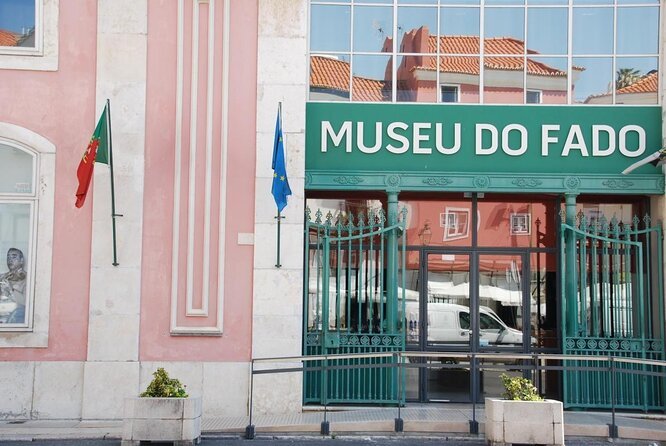
If you want to know more about Fado’s fantastic history, don’t miss the Fado Museum in the Alfama neighborhood, where the best Fado in Lisbon is located. Visiting this museum is like immersing yourself in the world of fado. Be prepared to feel many emotions while listening to the fadistas and learning more about the history of Portugal’s most famous musical expression.
In the museum, visitors will discover the history of fado from the first quarter of the 19th century to the present day. And all of this is possible due to generous donations. As you walk through the corridors, expect audiovisual presentations, multilingual information panels, and musical archives. The museum also explains the technical and historical development of the “Fado houses.” If you want to experience this musical style in the city of Lisbon, then the museum of fado is the perfect place for you.
Location: Largo do Chafariz de Dentro, N.º 1. 1100-139 Lisboa
How to get there: Bus – 728, 735, 759, 794 | Metro/Train – Santa Apolónia Station | Train – Santa Apolónia Station
Hours: Tuesday to Sunday: 10 AM – 6 PM
Fee: Regular Ticket – 5€
The Best Fado In Lisbon: 11 Fados Houses
Be quiet! Fado is about to be sung… (Silêncio, que se vai cantar o fado). To enjoy the best fado in Lisbon, please remember that the audience must be in complete silence when the guitar and voice come together. The fado houses (or casas de fado) are very introspective places and usually small, so we recommend you arrive early and (when possible) make a reservation.
Ready to learn about the best places to listen to this musical genre? Are you ready to discover the best fado in Lisbon?

Here is a selection of the best fado in Lisbon and some of the most famous Fado houses. Follow this itinerary and immerse yourself in the fado world. Enjoy it!
1. Casa de Linhares
Casa de Linhares is an elegant fado house inserted in a Renaissance building. It’s a lovely place to have a typical Portuguese dinner while listening to fado concerts. At Casa de Linhares, fado happens every night with one of the most iconic fado artists – Jorge Fernando, a major national reference, who played with Amália Rodrigues and is part of the permanent cast of Casa de Linhares, among other fado singers like Fábia Rebordão, Vânia Duarte and André Baptista. Jorge is accompanied by the Portuguese guitar of two of the best young guitar players, André Dias and Bruno Chaveiro.
Location: Beco dos Armazéns do Linho 2, 1100-037 Lisboa
Hours: Open Daily: 8 PM – 2 AM
Contacts: +351 910 188 118 / email: info@casadelinhares.com
2. Páteo de Alfama

Páteo de Alfama is located inside the preserved 17th-century palace of the “Lady of Murça.” It’s a comfortable traditional restaurant with big tables (great for groups), offering two dining halls, one dedicated only to fado and the other mixing fado with folklore. Artists like Luísa Rocha, Joana Melo, Manicha, and André Vaz used to perform at Páteo de Alfama, recreating the atmosphere of old taverns.
Location: R. de São João da Praça 18, 1100-117 Lisboa
Hours: Monday to Sunday: 7:30 PM – 11 PM
Contacts: +351 215 873 415 | email: booking@pateodealfama.pt
3. Mesa de Frades

Mesa de Frades is a great restaurant located in the Nossa Senhora da Conceição chapel of the Dona Rosa Palace. The former chapel and the palace was built in the 18th century by King Dom João V, for one of his mistresses. Expect to hear fado with a great acoustic!
Carminho used to sing in Mesa de Frades and now artists like Ricardo Ribeiro, José Manuel Barreto, Rodrigo Rebelo de Andrade, Tânia Oleiro, Pedro Moutinho and Ana Sofia Varela are the stars of the show. All of this plus an iconic location make Mesa de Frades an excellent choice to experience a fado show.
Location: R. dos Remédios 139, 1100-304 Lisboa
Hours: Monday to Saturday: 8:30 PM – 2AM
Contact: +351 917 0294 36
4. Tasca do Chico
How about taking the risk of singing a fado? At this typical Tasca located in the Bairro Alto district, you can! Anyone who wishes to sing there can do so. It’s a place with affordable prices and is always crowded. Arrive early so you won’t miss the fun. Live fado performances happen from Thursday to Sunday.
Location: R. do Diário de Notícias 39, 1200-141 Lisboa
Hours: Open Daily: 7 PM-2 AM
Contact: +351 961 339 696
5. Clube de Fado
Clube de Fado is among the most prestigious Fado Clubs near the Cathedral (Sé)—Sé de Lisboa. The house has a great cast of solid artists such as Rodrigo Costa Félix, Maria Emília, Carlos Leitão, and Cristina Madeira. While listening to the fadistas, you can taste traditional food like “Caldo Verde” or “Octopus Lagareiro.” It is a little expensive but worth it.
Location: Rua S. João Praça, 86 – 94
Hours: Opens Daily: 7:30 PM – 1 AM
Contact: +351 218 852 704
6. Senhor Vinho
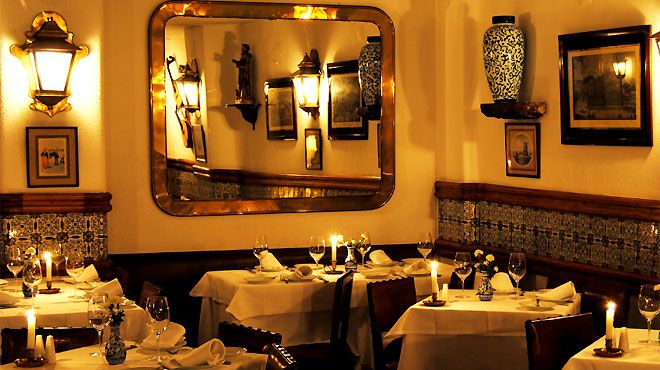
A night with good music and wine is the minimum you can expect at a place called Mr. Wine. This classic Lisbon venue (opened in 1975) is known as the great university of fado due to the big names from the fado world who used to sing here. Names such as Ada de Castro, Mariza, Camané, Ana Moura, António Zambujo and Gizela João.
The current cast has artists like Ana Sofia Varela, Vanessa Alves, Soraia Cardoso, Francisco Salvação Barreto and Duarte, accompanied by Paulo Parreira on Portuguese Guitar and Rogério Ferreira on Viola.
Location: R. do Meio à Lapa 18, 1200-724 Lisboa
Hours: Monday to Saturday: 8 PM – 2 AM
Contact: +351 213 972 681
7. Tasca do Jaime D´Alfama
At Tasca do Jaime, you can have an authentic experience of fado vadio, a bohemian kind of fado. Forget about formalities as the fado singers can enter spontaneously and improvise. Be prepared as the fado starts at about 5 PM, and the place is tiny. Don’t miss the “pasteis de bacalhau” and enjoy the show!
Location: R. de São Pedro 40, 1100-551 Lisboa
Hours: 4 PM to Midnight
Contact: +351 966 463 721
8. Maria da Mouraria
Located in the house where the fadista Maria Severa lived, Maria da Mouraria is a magical place. Enjoy an authentic Portuguese traditional meal while appreciating the fado singers in this comfortable restaurant. In connection with the Fado Museum, Maria da Mouraria offers several cultural initiatives related to fado. Be enchanted by fado through the voices of Ana Margarida, João Filipe, Maria da Nazaré, Teresa Siqueira
Location: Largo da Severa 1 e 2, Largo Severa 2, 1100-588 Lisboa
Hours: Wednesday to Sunday: 8 PM-2 AM
Contact: +351 934 450 130
9. O Faia

Founded in 1947, O Faia remains up to the present, a reference to Lisbon nightlife. It started as a family-run restaurant and remained so until 1980, when Carlos do Carmo, who then managed it, decided to sell it. António Ramos was, at that time, hired to work as a bartender. In the mid-90s, with the two sons, Pedro and Paulo, he assumed the management of O Faia, fulfilling this small restaurant’s fado (fate): being a family home, that of the Ramos family. Along with fantastic fado, the restaurant serves delicious traditional Portuguese cuisine prepared by Chef André Pola and his team.
Location: R. da Barroca 54 56, 1200-050 Lisboa
Hours: Monday to Saturday: 7:30 PM to 1 AM. Closed SUNDAYS
Contact: +351 342 6742
10. Adega Machado
Adega Machado was founded in 1937 and is located in the typical district of Bairro Alto in Lisbon. It has recently undergone a transformation. The facade has been revamped with the works of the artist Thomaz de Mello holds the looks, and once you step inside, you’ll be lost in admiration of the three floors, all decorated with photos of the restaurant’s history and tradition.
The restaurant has a central area, a wine cellar where you can purchase wines, a Sala da Fadistagem, perfect for small groups, and a terrace that offers a quiet retreat for a glass of wine.
Location: R. do Norte 91, 1200-284 Lisboa
Hours: Open every day from 7:30pm to 2:00am
Contact: +351 342 2282
11. Parreirinha de Alfama
Parreirinha de Alfama began as a coal shop and eating house. Still, through the years, owned and operated by the legendary Fado singer Argentina Santos from the 1950s, it became a point of reference for great fado and great food. The voices of Amália, Alfredo Marceneiro, Berta Cardoso, Lucília do Carmo, Mariana Silva, Celeste Rodrigues, and so many others, echoed between its four walls. Parreirinha de Alfama preserves the tradition of fado in the familial and informal environment that fado seeks. This is the oldest fado house (and is located in the Alfama district).
Location: Beco do Espírito Santo 1, 1100-222 Lisboa
Hours: Wednesday to Sunday: 8 PM-1 AM
Contact: +351 886 8209 | RESERVE ONLINE HERE
Extra! Best Fado in Oporto
If you are around Oporto, there is also a great place to hear fado live music. If you are interested, there are also a lot of great Porto Fado experiences, like this Porto Heritage Night Tour With Fado Show And Dinner Included and this Porto City Tour Half Day with Dinner and live Fado Show.
Casa da Mariquinhas

Located in the heart of the city, in the typical district of Sé, the Casa da Mariquinhas have 50 years of history. Through these doors, great names of the national fado have passed and continue, without microphones, with the greatest intimacy and proximity to the public.
Location: R. de São Sebastião 25, Porto
Hours: Monday to Saturday: 7:30 PM – 11 PM
Contact: +351 915 613 877
Let’s Sing Fado?
After learning all about the best fado in Lisbon, how about experiencing this Portuguese music? At Museu do Fado, you can learn how to sing fado, and there’s no need to be Celine Dion. Everyone can sing since this music comes from the soul. Just think about a broken heart, someone or something you miss, and you are ready to go!
To participate in the Sing Fado workshop, you must send an e-mail to info@museudofado.pt, book a class and have fun.
Important Fado Singers
What would be the fado without the fadistas? Get to know some essential artists that made and still make fado alive worldwide.
Amália Rodrigues
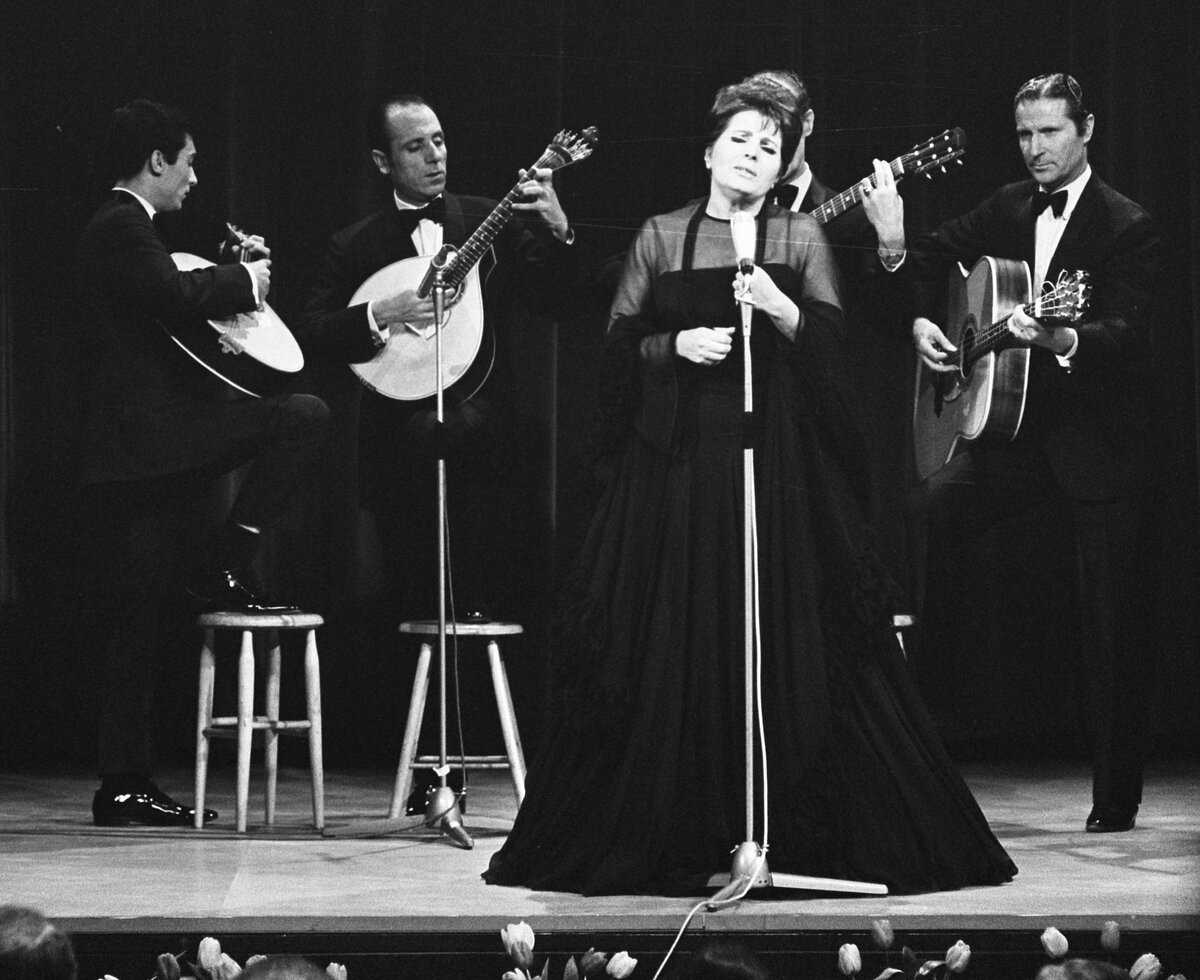
O fado sente-se,
não se compreende,
nem se explica.
– AMÁLIA RODRIGUES
“The fado is felt, it’s not understandable, it’s not even explained.” Amália Rodrigues is the world’s greatest singer of traditional Portuguese fado music and was responsible for spreading this music around the world. Amalia Rodrigues is also known as the queen of fado.
Her career started when she was only fifteen (in 1935). She brought essential innovations in the behavior and customs of fado singers, like always wearing a black dress and shawls and standing in front of the musicians. The fadista died in 1999, and her voice became immortal in beautiful songs like “Uma Casa Portuguesa” e “Chiera a Lisboa.”
Ana Moura
Ana Moura is a Portuguese fado singer who represents the new generation of famous fado singers focusing on tackling contemporary issues. Born in 1979, she was the youngest fadista nominated for a Dutch Edison Award.
One of the memorable moments of Ana Moura’s career was when she sang No Expectations with the Rolling Stones in 2007. Ana Moura was consecrated as the greatest fado singer of the 21st century and is the most awarded singer in Portugal. Her records are still top sellers around the country.
Mariza
Marisa dos Reis Nunes (born in 1973), known professionally as Mariza, is a Portuguese singer. Born in Mozambique, she came to live in Portugal when she was three years old and moved to Mouraria, where she had her first contact with fado.
In 1999 Mariza became known when she performed Fado by Amália Rodrigues in shows organized in honor of this great Fado Queen. After this, she was invited to participate in TV shows, released several albums, and was awarded and internationally recognized for her music.
Carminho
Maria do Carmo Carvalho Rebelo de Andrade (born in 1984 in Lisbon), better known as Carminho, comes from a family of musicians since her mother, Teresa Siqueira, was a famous fado singer. She is considered one of her generation’s most talented and innovative fado singers since her eclectic work shows both traditional and contemporary fado.
One of the highlights of his successful career is the album “Carminho Canta Tom Jobim” (2016), an invitation she received from the family of one of the greatest composers in the world.
Fado Bicha
Fado Bicha is a contemporary musical and activist project created and developed by Lila Fadista in voice and lyrics and João Caçador in instruments and arrangements. These musicians provide an unprecedented exploration of the fado universe and focus on overcoming the rigid genre barriers of traditional fado.
This “queer fado” defies fado’s traditions by bringing into its lyrics the stories of the LGBTI community. The duo performs worldwide and became more popular after participating in Festival da Canção 2022, broadcasted on television.
More Lisbon Travel Articles
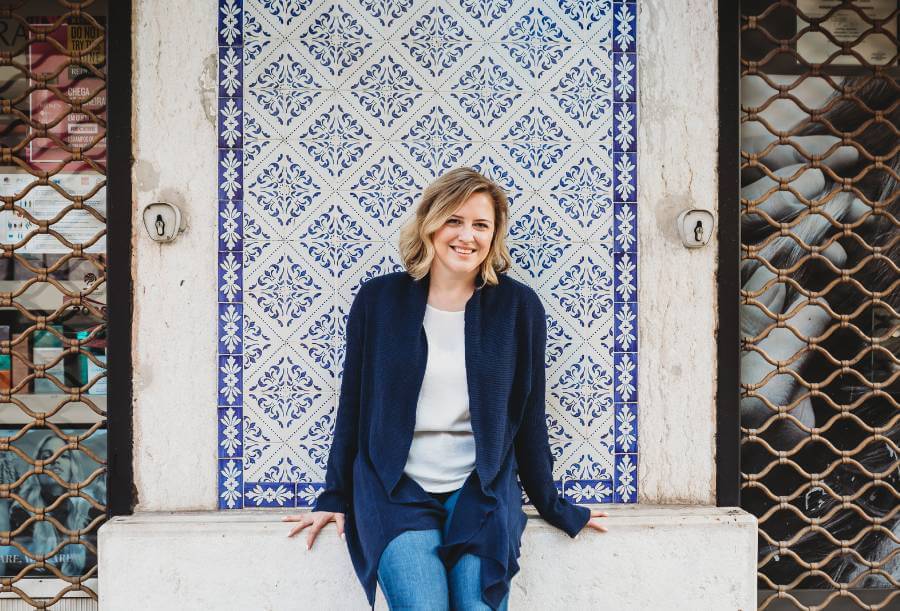
I can tell you firsthand that a Lisbon tour one of the best ways to enjoy Lisbon— so I’m glad you landed on this article to book yours.
If you’re looking for more info on traveling to Lisbon Portugal, check out these additional Lisbon travel guides:
- 20 Best Day Trips From Lisbon: Incredible Places To Visit
- 15 Best Boat Tours In Lisbon: An Unforgettable Journey
- 8 Best Pastel De Nata Classes In Lisbon, Portugal
- 40 Best Sights In Lisbon: Exploring Portugal’s Capital
- Wine Tours In Lisbon: 12 Amazing Sip And Savor Experiences
- 15 Food Tours In Lisbon: A Guide To The Best Eats In The City
- Visiting Lisbon? The Best Area To Stay In Lisbon
- The 23 Best Boutique Hotels In Lisbon
- The 28 BEST Vegan & Vegetarian Restaurants In Lisbon
- The Best Fado In Lisbon: 11 Fado Houses To Explore
Final Thoughts: The Best Fado in Lisbon
And there you go, the history of fado, the best fado clubs to visit in the Portuguese capital, and a great option in Porto! If you want to see a casa de fado, the best way the immerse yourself is to make a reservation at one of the popular fado restaurants listed above.
So, where can you experience the best Fado in Lisbon? We hope we’ve answered that question, and if you end up going, let us know how you like the experience!

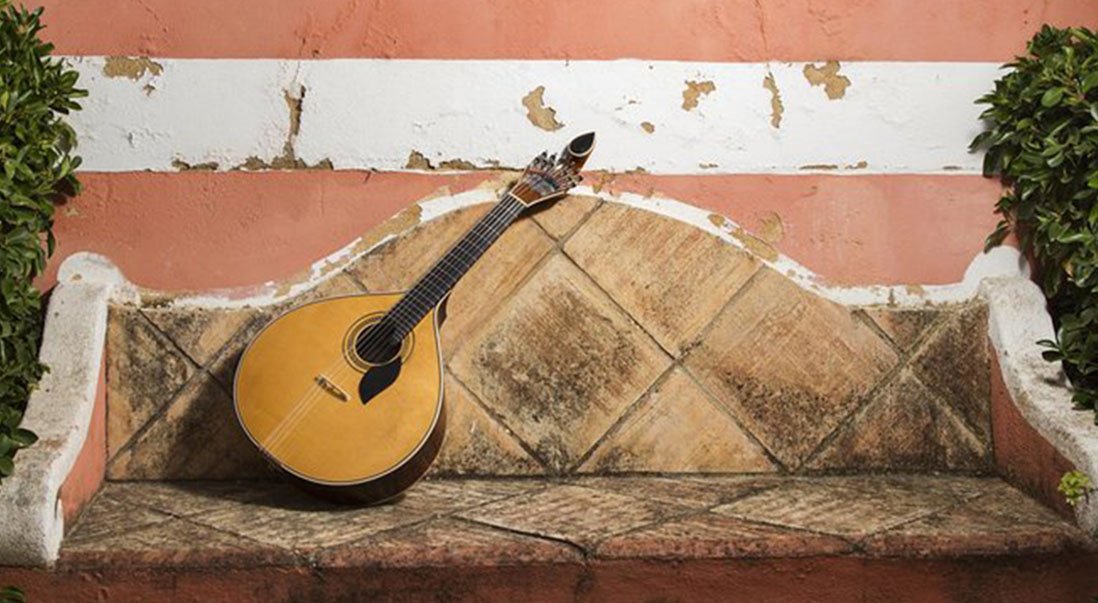
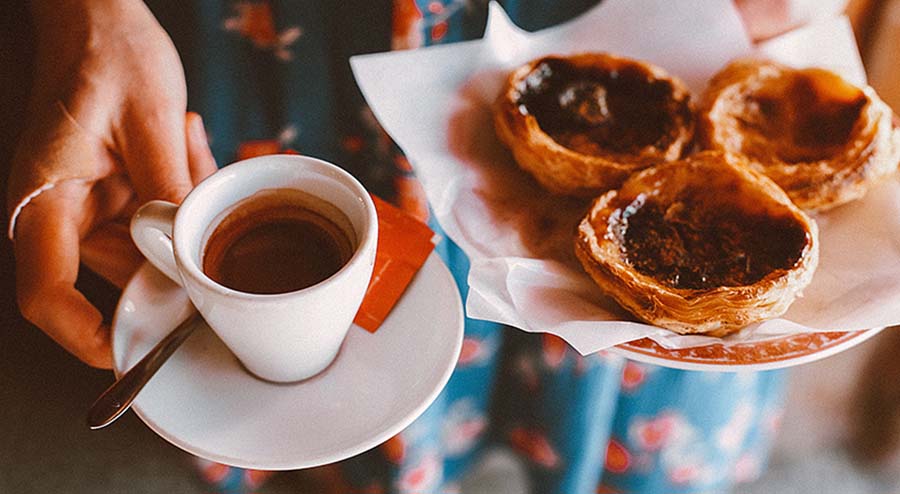

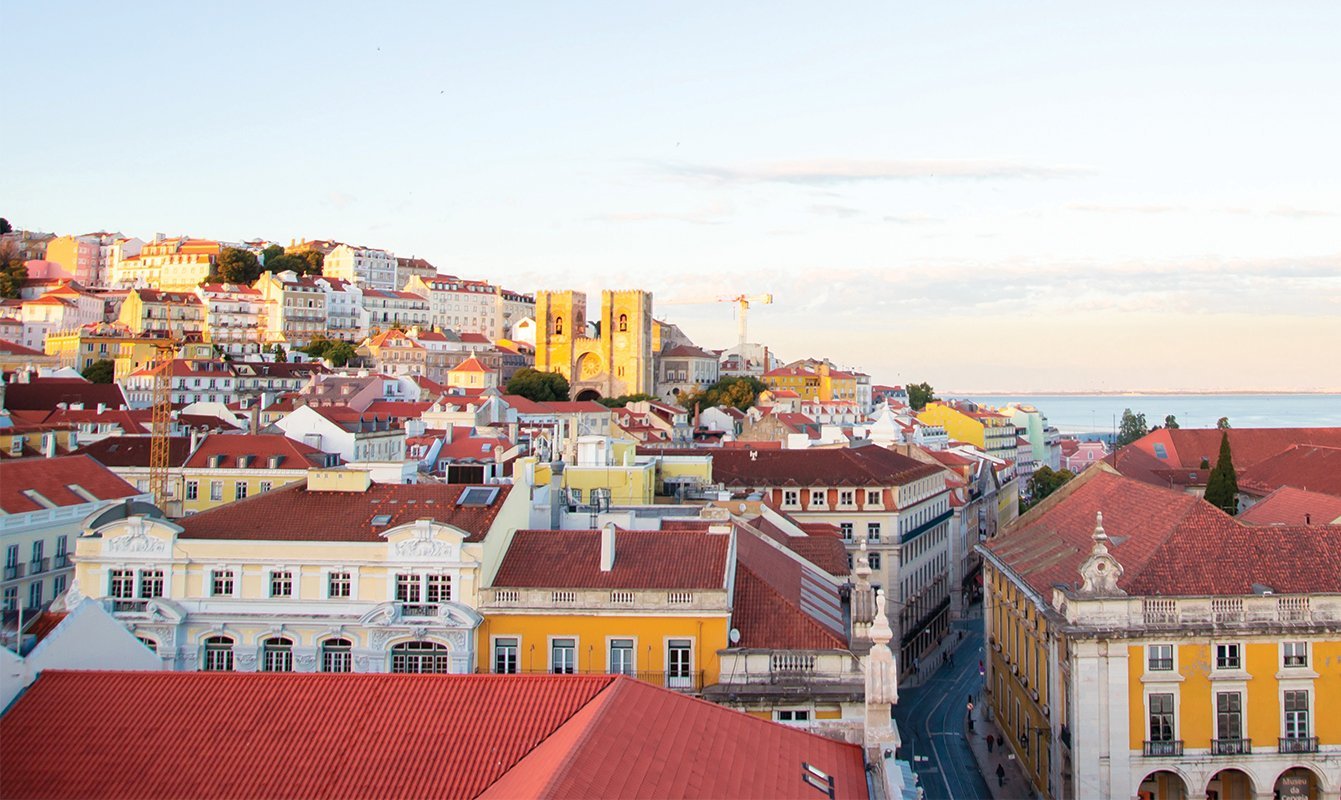

![Lisbon in Winter: The Ultimate Lisbon Winter Guide [2024]](https://nowinportugal.com/wp-content/uploads/2023/11/Lisbon-in-Winter.jpg)
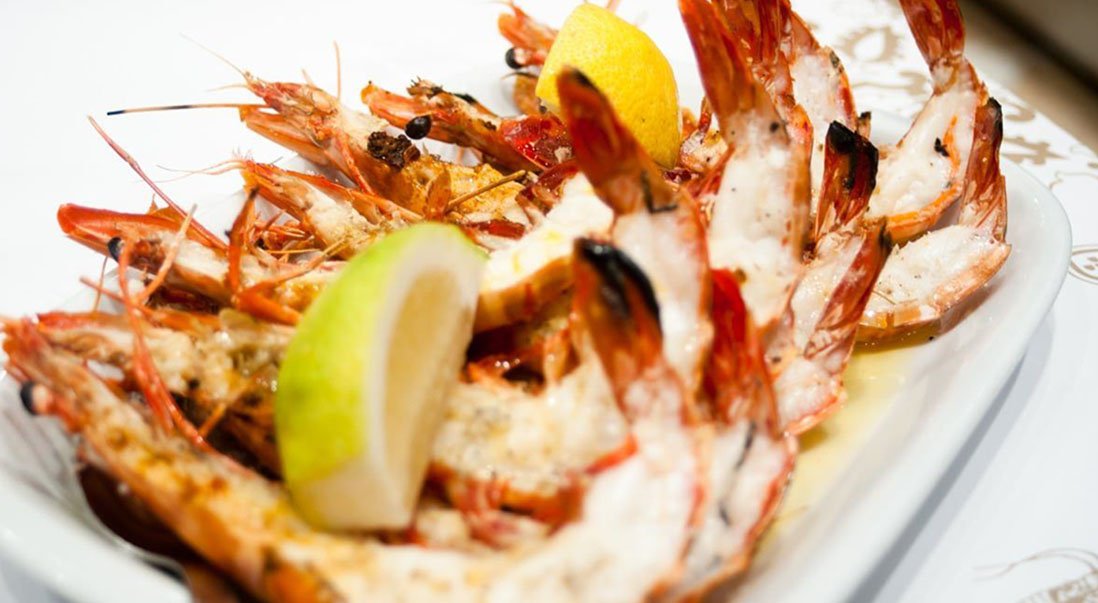
Cris, que ótima essa reportagem! Adoro FADO!
Thank for this wonderful list. May I ask–Are Fado performance always in a restaurant setting? I have mixed things about the food at Fado restaurants and I was wondering if there is a place to listen to it without the food component.